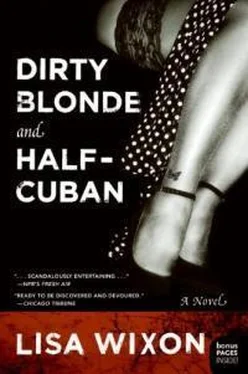Lisa Wixon - Dirty Blonde and Half-Cuban
Здесь есть возможность читать онлайн «Lisa Wixon - Dirty Blonde and Half-Cuban» весь текст электронной книги совершенно бесплатно (целиком полную версию без сокращений). В некоторых случаях можно слушать аудио, скачать через торрент в формате fb2 и присутствует краткое содержание. Жанр: Современная проза, на английском языке. Описание произведения, (предисловие) а так же отзывы посетителей доступны на портале библиотеки ЛибКат.
- Название:Dirty Blonde and Half-Cuban
- Автор:
- Жанр:
- Год:неизвестен
- ISBN:нет данных
- Рейтинг книги:4 / 5. Голосов: 1
-
Избранное:Добавить в избранное
- Отзывы:
-
Ваша оценка:
- 80
- 1
- 2
- 3
- 4
- 5
Dirty Blonde and Half-Cuban: краткое содержание, описание и аннотация
Предлагаем к чтению аннотацию, описание, краткое содержание или предисловие (зависит от того, что написал сам автор книги «Dirty Blonde and Half-Cuban»). Если вы не нашли необходимую информацию о книге — напишите в комментариях, мы постараемся отыскать её.
Dirty Blonde and Half-Cuban — читать онлайн бесплатно полную книгу (весь текст) целиком
Ниже представлен текст книги, разбитый по страницам. Система сохранения места последней прочитанной страницы, позволяет с удобством читать онлайн бесплатно книгу «Dirty Blonde and Half-Cuban», без необходимости каждый раз заново искать на чём Вы остановились. Поставьте закладку, и сможете в любой момент перейти на страницу, на которой закончили чтение.
Интервал:
Закладка:
“Peanut butter?” asks Limón.
“You’re kidding,” Jesús says. “They don’t have that here, either? Man, you guys are in for a shock when things change—”
“Never mind,” I say to Limón, whose pride is visibly wounded. Like most of his countrymen, Limón views himself as erudite and sophisticated. Considering the high level of education here, it’s a warranted belief, and Limón is one of the brightest people I’ve ever known. Whenever extranjeros—consciously or not—suggest the Cuban is less than worldly, hackles will be raised.
“It’s like most of the stuff you don’t have here,” I say, trying to cool Limón down. “Overrated.”
But Limón sulks just the same.
We spend the day sightseeing. A clinic for handicapped children. A home for Alzheimer’s patients. A rural retreat—bucolic and relatively luxurious—for those with HIV. A beach compound for Ukrainians, Russians, and Belarussians suffering from the crippling and sometimes grotesque effects of Chernobyl. All are offered free of charge to the poorest of people.
Despite his antigovernment sentiments, Limón bursts with pride on our tour, needed to acquaint Jesús with the local culture. Limón’s effusions give me the feeling we’re paying for our peanut-butter comments.
“Unlike most of Latin America, we’re not being run by a U.S. puppet government,” says Limón. “And no other country has these kinds of benefits like free medical care and education.”
I roll my eyes. It’s an argument I hear all the time. “You mean, except Canada, and most of Europe,” I say, but Limón’s not listening.
“It’s bullshit here,” says Jesús. “You’re fine if you’re poor and sick, but what if you want to make money?”
“Money isn’t everything,” I say.
But Jesús ignores me. “I’m going to the USA to make money. Make lots and lots and lots of money. Join a real gang. Be like Tony Montana. Like Scarface, coño.” He shoots off an imaginary machine gun.
Limón shifts uncomfortably in his seat. In macho societies such as Cuba’s, women are expected to adhere to extreme forms of femininity, and men are obsessed with proving their manhood. A man’s ability to provide financially for those he loves is the defining latinocharacteristic. A lack of avenues, legal or otherwise, for cubanosto make a living is the singular demasculinizing factor. And daily visions of their cubanabeauties with richer, foreign men provide a fresh slap in the face.
“ Mira,tell me really how people here feel about the leadership,” says Jesús with a twisted smirk. “For my interview with the Americans.”
“Ambivalent,” says Limón, after a few minutes. “A few people hate it and a few people love it and most people love it andhate it.”
As a norteamericano,I’m unaccustomed to the Latin way, that idea that opposing beliefs can be held simultaneously, in one human heart, without a need for a settlement. As a cubananow—as a latina—I try to open myself to the duplicities, and allow them to grow and coexist peacefully in my consciousness. But it’s an adjustment.
Watching Limón quietly protest against the strictures with his Rasta dreads makes me wonder how he can be so ambivalent himself, particularly since he, a black man, is singled out by police more often than whites, and especially while careening about publicly with blanca-skinned foreigners.
“What do you think?” Jesús asks me. “About the government?”
“Not allowed an opinion,” I say, miming a zipper crossing my lips. “If I say I hate it, I’m told my opinion doesn’t count ’cause I don’t livelife here, and if I say I love it, I’m told I’m from afuera.”The outside.
“Your country was also started by a revolution,” says Limón, looking at me. “There were growing pains. Like here.”
“Who was it?” I say, knowing it’s safer to discuss politics in the abstract. “Camus? Who said the revolutions of the left and the revolutions of the right are barely distinguishable?”
“Yeah, Camus,” says Limón. “The French guy, an interesting hombre.”
“Who?” says Jesús, looking confused.
“They let you read Camus here? I’d imagine he’s almost a heretic,” I say.
“Who the fuck is Camus?” says Jesús, flicking his cigarette out the window.
“ Pero,you do know about—what is it, the butter of peanuts?” harrumphs Limón under his breath, shooting a victorious glance at Jesús.
Like most Cuban hustlers, and I’d never tell him this, Limón’s clownish appearance conceals a book-smart knowledge he accesses easily and readily. He’d talk intellectual circles around an American frat boy and make a stimulating companion for the intellectual set. When I once told him how lucky he is to be so educated, compared to the citizens of other Latin countries, he dismissed me with a snicker. We’re European and African, he told me, and comparing us with Mexico or Central America is all mixed up, like arroz con mango.
“I’m telling you, this shit here is fucked,” says the hunky Dominican, taking the last word. “Could never live here. Never.”
The Cuban system is loved. It’s hated. But pride and fear—including a wariness of any alternate system—keeps most people from protesting too loudly.
As the day recedes, Limón and Jesús play a few rounds of soccer with survivors of the Chernobyl disaster, who have complimentary beachside apartments near Havana, where they rest in the warmth and are attended to by skilled physicians. Some have silent, invisible killers eating away at their cells. Others have tumors on their heads or backs the size of an Isle of Pines grapefruit. Their convalescence, a gift from the Cuban people, is given despite the political debt to Russia being all but extinguished. The small happiness, Limón tells me, makes their fragile lives bearable.
31
T he Hill, El Cerro,is a working-class neighborhood famous for its petty thieves. There are no decorations to indicate the approaching Christmas season, as stringed lights and plastic reindeer aren’t sold. In the warmth of winter, it hardly feels like the holidays anyhow.
With a half a year already behind me, I’m growing more frustrated by the lack of information about my family. I’m hoping the man inside this house will be my Santa Claus.
Limón knocks at the door, and we wait.
Limón’s midnight skin is offset by stark white pants, shirt, and driving cap. Light beads of sweat cascade down his fresh face.
“What do you meanyou spent all three grand already?” I whisper, incredulous.
He shyly ticks off his purchases from the sale of his carnetto the Dominican: a new washing machine for his mother; a quinceparty for his sister; a water tank that doesn’t churn out rust; and beds for the family, who’d been sleeping on plank wood and blankets.
Although he’s proud of his family contributions, I scold him for not saving part of his windfall for harsher days.
“¿Cuál es el punto?”he asks. “I can’t put it in a bank porquethey might connect the missing carnetto the cash. Besides, thieves can steal it or the dollar-store prices will, ya tú sabes…” He jacks his thumb skyward.
Limón isn’t alone. Few understand the concept of a savings account. If money is around, it’s spent. Parties, clothes, roast pigs. In a culture that doesn’t put much premium on the future, mañanais left to be “resolved” anew.
A shy teenage girl answers the door and shows us in. It’s the house of a famous babalocha,a Santero priest capable of communing with coconut oracles and dead ancestors. I try to resist my skepticism, but when I see the fresh bloodstains on the wall I’m overcome with doubt.
“Animal sacrifices?” I whisper to Limón.
Читать дальшеИнтервал:
Закладка:
Похожие книги на «Dirty Blonde and Half-Cuban»
Представляем Вашему вниманию похожие книги на «Dirty Blonde and Half-Cuban» списком для выбора. Мы отобрали схожую по названию и смыслу литературу в надежде предоставить читателям больше вариантов отыскать новые, интересные, ещё непрочитанные произведения.
Обсуждение, отзывы о книге «Dirty Blonde and Half-Cuban» и просто собственные мнения читателей. Оставьте ваши комментарии, напишите, что Вы думаете о произведении, его смысле или главных героях. Укажите что конкретно понравилось, а что нет, и почему Вы так считаете.












